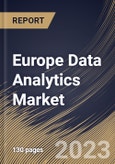The demand for connected devices is increasing, which hastens the adoption of edge computing. Edge computing solutions, in contrast to clouds, deploy processors nearer to the data origin or destination. With data analytics activities at the edge, organizations increase their responsiveness and efficiency. Due to its capacity to handle data in real-time along with a quicker response time, edge computing is especially suitable for the IoT.
Businesses use data analytics because it allows them to manage, organize, and streamline enormous datasets while also improving their ability to make data-driven decisions. Additionally, the fundamental goal of business analytics and big data is to aid companies in better understanding their target markets and customers, hence increasing marketing initiatives. These characteristics are projected to increase adoption by multiple businesses from different industries, which would fuel the market's rise in data analytics.
Germany is also among the top countries regarding demand, OEM presence, and system Integrator presence for automation. OEMs are also well-represented throughout Europe, with particular strength in Germany, the Netherlands, Italy, France, and Spain. Poland and the Czech Republic are also developing into logistical hubs with excellent economic prospects in Central and Eastern Europe. Additionally, the region has seen a sharp increase in e-commerce. For instance, digital purchases of high-end goods and services account for 80% of all retail customer sales in Luxembourg. Ireland is second, with e-commerce accounting for more than 60% of its retail sector share. Austria completes the top three e-commerce consumer markets in Europe, outpacing the EU-16 average of 25% of total online sales in 2020, with 47% of its retail sales conducted online. As a result, the expansion of automation and expanding e-commerce are promoting regional market growth.
The Germany market dominated the Europe Data Analytics Market by Country in 2022, and would continue to be a dominant market till 2030; thereby, achieving a market value of $20,130.9 million by 2030. The UK market is anticipated to grow at a CAGR of 25.2% during (2023-2030). Additionally, The France market would exhibit a CAGR of 27.2% during (2023-2030).
Based on Type, the market is segmented into Predictive Analytics, Customer Analytics, Descriptive Analytics, Prescriptive Analytics and Others. Based on Application, the market is segmented into Supply Chain Management, Enterprise Resource Planning, Database Management, Human Resource Management and Others. Based on Solution, the market is segmented into Security Intelligence, Data Management, Data Monitoring and Data Mining. Based on countries, the market is segmented into Germany, UK, France, Russia, Spain, Italy, and Rest of Europe.
The market research report covers the analysis of key stake holders of the market. Key companies profiled in the report include Amazon Web Services Inc., IBM Corporation, Google LLC (Alphabet Inc.), Mu Sigma, Inc., Oracle Corporation, SAP SE, Sisense Inc, Microsoft Corporation, ThoughtSpot Inc. and Zoho Corporation Pvt. Ltd.
Scope of the Study
By Type
- Predictive Analytics
- Customer Analytics
- Descriptive Analytics
- Prescriptive Analytics
- Others
By Application
- Supply Chain Management
- Enterprise Resource Planning
- Database Management
- Human Resource Management
- Others
By Solution
- Security Intelligence
- Data Management
- Data Monitoring
- Data Mining
By Country
- Germany
- UK
- France
- Russia
- Spain
- Italy
- Rest of Europe
Key Market Players
List of Companies Profiled in the Report:
- Amazon Web Services Inc.
- IBM Corporation
- Google LLC (Alphabet Inc.)
- Mu Sigma, Inc.
- Oracle Corporation
- SAP SE
- Sisense Inc
- Microsoft Corporation
- ThoughtSpot Inc.
- Zoho Corporation Pvt. Ltd.
Unique Offerings
- Exhaustive coverage
- The highest number of Market tables and figures
- Subscription-based model available
- Guaranteed best price
- Assured post sales research support with 10% customization free
Table of Contents
Companies Mentioned
- Amazon Web Services Inc.
- IBM Corporation
- Google LLC (Alphabet Inc.)
- Mu Sigma, Inc.
- Oracle Corporation
- SAP SE
- Sisense Inc
- Microsoft Corporation
- ThoughtSpot Inc.
- Zoho Corporation Pvt. Ltd.








